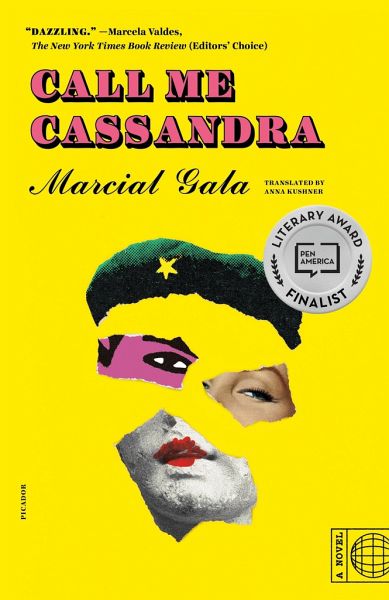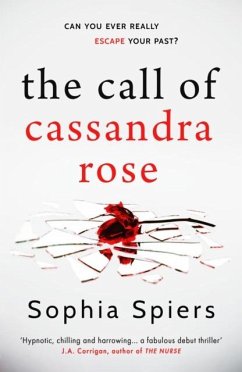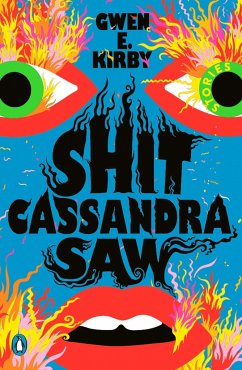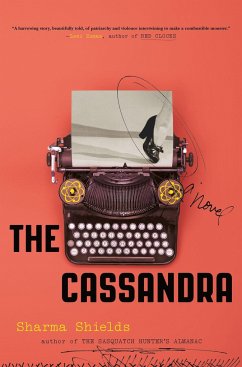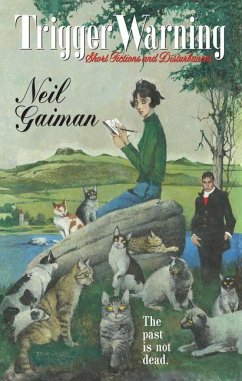Marcial Gala
Broschiertes Buch
Call Me Cassandra

PAYBACK Punkte
8 °P sammeln!




From the author of the award-winning The Black Cathedral, a darkly magical tale of a haunted young dreamer, born in the wrong body and time, who believes himself to be a doomed prophetess from ancient Greek mythology.
Marcial Gala is a novelist, a poet, and an architect from Cuba. He won the Pinos Nuevos Prize for best short story in 1999. His novel The Black Cathedral received the Premio de la Crítica Literaria and the Alejo Carpentier Award in 2012 and was published in English by FSG in 2020. Gala also won the 2018 Ñ Prize of the City of Buenos Aires-Clarín for Call Me Cassandra. He lives in Buenos Aires and Cienfuegos. Anna Kushner, the daughter of Cuban exiles, was born in Philadelphia and has been traveling to Cuba since 1999. In addition to The Black Cathedral and Call Me Cassandra, she has translated the novels of Norberto Fuentes, Leonardo Padura, Guillermo Rosales, and Gonçalo M. Tavares, as well as two collections of nonfiction by Mario Vargas Llosa.
Produktdetails
- Verlag: St Martin's Press
- Seitenzahl: 224
- Erscheinungstermin: 10. Januar 2023
- Englisch
- Abmessung: 210mm x 137mm x 13mm
- Gewicht: 270g
- ISBN-13: 9781250863003
- ISBN-10: 1250863007
- Artikelnr.: 63868884
Herstellerkennzeichnung
Libri GmbH
Europaallee 1
36244 Bad Hersfeld
gpsr@libri.de
Raul is nothing like the other kids. The ten-year-old boy can see dead people and he knows when those he meets will die. Of course, he cannot be understood by his peers or family and with his love for dresses and his very small body, he frequently becomes the victim of bullying and is called all …
Mehr
Raul is nothing like the other kids. The ten-year-old boy can see dead people and he knows when those he meets will die. Of course, he cannot be understood by his peers or family and with his love for dresses and his very small body, he frequently becomes the victim of bullying and is called all sorts of names. He himself knows who he is, Cassandra, the ancient goddess who could predict the future but wasn’t believed. So is he. He grows up in his hostile Cuban surroundings and has to train for the military service which will lead him to Angola, a sister state of the Leninist-Communist era of the 1970s. His gift is a burden he cannot share with people, only with the gods he sees and whom accompany him.
Fiction that transgresses the border between fictional reality and fantasy are not necessarily my favourite genre, yet, Cuban born author Marcial Gala cleverly integrates both and thus creates a wonderful protagonist for his novel “Call me Cassandra”. Raul is gifted and cursed at the same time, not necessarily the best combination in a hostile world where he has to prepare for fighting in a war. Fantasy is a way to escape and maybe the only one to endure the world around him.
There are two fascinating aspects about the novel, first of all, Raul’s way of escaping his father’s virile expectations which he knows already as a small boy, he will never be able to fulfil. Thus, he can only find likeminded persons in the women around him, most of all his father’s Russian lover. Literature opens different ways of thinking where Raul can find alternatives to his life that he can only live behind closed doors as boys dressed in women’s clothes are nothing for the Cuban world of the 1970s.
The second, much more horrifying is what the transgender boy has to go through, first at school and later in the army. He is not only bullied but repeatedly the victim of violence and abuse. Yet, nobody seems to care, it seems as if it is ok since Raul does not fulfil the expectations and this does not belong.
Gala elegantly conveys Raul’s different realities and allows a fascinating insight in the boys unique thinking.
Weniger
Antworten 0 von 0 finden diese Rezension hilfreich
Antworten 0 von 0 finden diese Rezension hilfreich
Andere Kunden interessierten sich für




